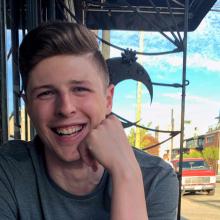Jonathan Doucette
Why did you decide to pursue a graduate degree?
I have always been enamored with scientific research. During my undergraduate degree, I completed two Co-op terms involving research projects. The latter project was under my now-supervisor Dr. Alexander Rauscher, and the work was so interesting and exciting that I simply had to stick around for more!
Why did you decide to study at UBC?
As someone who was born and raised in Vancouver, UBC was always on my mind as a potential university which I would like to study at. I was sold on UBC during high school when I attended an Engineering Physics open house session, and the rest is history.
What is it specifically, that your program offers, that attracted you?
The physics degree was enticing in itself, but more than anything it was my supervisor Dr. Alex Rauscher. He has been an amazing mentor, guiding me through the world of MRI physics while also giving me the freedom to pursue all of my crazy ideas.
What was the best surprise about UBC or life in Vancouver?
UBC is truly its own little city somewhat separate from the rest of Vancouver, and I didn’t realize how much I would love studying in such an environment. It’s a beautiful campus, and I’ve really enjoyed my time here!
What aspect of your graduate program do you enjoy the most or are looking forward to with the greatest curiosity?
I enjoy MRI physics because it is something of a playground for mathematical physics and machine learning. There is a plethora of data to analyze, and a virtually unlimited number of ways to do so. It is a great challenge, but it is also very rewarding as at the end of the day we are aiming to improve MRI images for their use in medicine.
What do you see as your biggest challenge(s) in your future career?
I think working in a field like MRI is quite humbling; while we have the ability to improve peoples lives by improving MRI images, we have to be very rigorous to ensure that the images we generate are faithful to the underlying biology. This is especially true in machine learning applications, where it is much more difficult to understand how the image is being generated, and my future career will no doubt make use of these methods.
My research is preparing me well for these challenges. We discuss and improve issues related to these difficulties all the time, be it in our lab or at conferences. MRI is a fast moving field that lives on the cutting edge of technology, software development, and clinical applications, and I am constantly learning about how to these many challenges interact.
What aspects of your life or career before now have best prepared you for your UBC graduate program?
Academically, it was my Engineering Physics undergraduate degree, as well as my Minor in Honours Mathematics. I make use of the engineering, physics, and math knowledge acquired during my studies on a daily basis. In my personal life, it was certainly my parents. They have always supported me in my career path, and from a young age I was taught the importance of thinking critically and to always try my best. “If it’s worth doing, it’s worth doing right” - right Mom?
What do you like to do for fun or relaxation?
I love basketball. Be it playing basketball, watching NBA basketball, listening to basketball podcasts, or deep diving into basketball analytics to defend my favourite players, I love it all.
What advice do you have for new graduate students?
Read papers from other fields, and try to connect them to your own research. If you are struggling with figuring out how to solve something, there is a good chance somebody else has struggled with the same problem! Similarly, dedicate lots of research time to trying to think of weird and interesting ideas to improve the status quo, and generally try to look at problems from as many perspectives as possible.
Learn more about Jonathan's research
My work revolves around using MRI physics models coupled with machine learning in order to extract quantitative tissue parameters from brain MRI scans. Accurately estimating these parameters gives us a better picture of microstructures in the brain such as blood vessels or myelinated nerve fibres. This process is difficult, however, due to the complexities of MRI physics in biological tissue; by using machine learning methods to improve our physics models, the resulting parameter estimations are improved as well. Ultimately, I aim to help map brain tissue damage and repair in multiple sclerosis, traumatic brain injury, or preterm babies.


